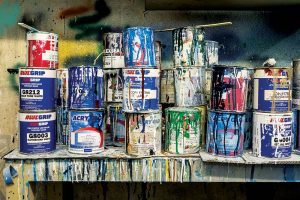By Godfrey Ofurum
-
Say industry has capacity to be major jobs creator
-
Industry faces infrastructure challenges
-
As supply chain is hampered
Nigeria’s paints manufacturing industry can become one of the country’s highest employers of labour if the right and adequate infrastructure is put in place for it to operate at optimum.
Currently, the sector is faced with so many challenges, including lack of power, bad road network, which make it difficult for seamless distribution of raw materials and finished products, as well as multiple taxation across the country.
The country, currently ranked third biggest exporter of paints in Africa, is ironically ranked seventh on the list of countries in Africa that import paints, especially industrial paints.

Osidipe, while delivering a lecture at the biannual Coating Show of the Paint Manufacturers Association of Nigeria, (PMAN) titled, “Maximising the Opportunities of the African Continental Free Trade Area in post-Covid Era”, held in Lagos, noted that Nigeria needs to have a trade policy in place before signing trade agreements, stressing that a draft was submitted for the first time to the minister of industry, trade and investment two weeks ago as a result of advocacy.
He pointed out that the essence of a trade policy is to clearly define the area of interest, explaining that during negotiations, agreements must be signed in line with national aspirations.
Osidipe emphasised the need for the government to put the right infrastructure in place to enable Nigerian industry players to benefit from the trade pact.
According to him, “AfCFTA, like any other agreement, is not a playground for countries that have not been able to satisfy local demands. Nigeria must adopt strategies where we can have aggregations and that is part of the strategies that the Nigerian government is looking at where you aggregate the output of a number of SMEs so that you have the right quantity to which you can possibly trade.”
Ambolu Babatunde, chairman, PMAN, lamented the scarcity of foreign exchange for manufacturers, regretting that skyrocketing prices of raw materials and packaging inputs for paints production is pushing the cost of production to the rooftop.
Babatunde, noted that the sector is still bedevilled with a myriad of challenges, emphasising that the sector and its members are yet to recover fully from the trying negative effects of the Covid-19 pandemic.
“The industry is still struggling with the effects of the Covid-19 shutdowns in 2020. The sector is still being challenged by scarcity of foreign exchange, skyrocketing prices of paints raw materials and packaging inputs as well as sales of finished paint products. These bottlenecks have pushed the cost of production to the rooftop.
“They have also made the business environment unfavourable and unattractive to investors. With these challenges, our products will be uncompetitive when the African single market eventually takes off.
“We appeal to the government to come to our aid by coming up with policies and programmes that will stimulate activities in the paints industry in particular and the manufacturing sector in general.
The PMAN chairman assured paints users in the country and Africa that PMAN is committed to transiting to the reformulation/production of lead free paints for a healthy environment, saying that monitoring and enforcement are billed to commence soon.
He noted that its members are yet to explore African markets fully, stressing that only a fragment of players in the industry is selling their products through the informal routes to some West African countries.
He stressed the need to explore ways and strategies to penetrate other markets outside the shores of the country.
“There is the need for paint manufacturers in Nigeria to adhere to current and future developments in the manufacture and sale of paints, as well as developments in raw material input for industry. Other issues include lead content paints, environmental issues, improved quality of their products to enable members to benefit from the African Continental Free Trade Area (AfCFTA), which is in full swing.
“Some industry players have observed that the paint industry is facing the challenges of dearth of middle level manpower (paint technicians) and have called for the restart of the Certificate programme in Paints and Coatings Technology at the Yaba College of Technology. The programme collapsed due to wrong management decisions at the institution.
“The National Executive Council, our parent body and other stakeholders are looking at the various options available. The programme may be run on a new arrangement if things work out as envisaged,” he said.
Ibrahim Hussain Dojo, chief executive officer, Raw Materials Research and Development Council (RMRDC), said that the industry has grown and evolved over time, stating that Nigerian paint industry is one of the largest gross domestic product (GDP) contributors in the country and a major player in the employment of labour and economic advancement.
He noted that the industry has witnessed technological advancements in the methods of production as a result of new innovations, saying that the event is ideal at this time, as it provides a platform for manufacturers to exchange and share ideas and knowledge with high level decision makers, suppliers, professionals and other stakeholders.
In his words, “The programme also provides a window to assess latest technologies and networking opportunities. This show is taking place at an appropriate time to showcase the capabilities of the Nigerians coating industry in value added products such as raw materials, machinery, finished paints, ink and allied products. It will also identify some gaps that might have hindered the country from assessing the benefits of the trade area. I want to use this opportunity to assure the key stakeholders in the coating industry that the Council will continue to collaborate with you in enhancing local raw materials for the industry.”








